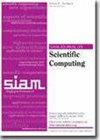EnKSGD:一类有前提条件的黑箱优化和反演算法
IF 2.6
2区 数学
Q1 MATHEMATICS, APPLIED
引用次数: 0
摘要
SIAM 科学计算期刊》,第 46 卷第 3 期,第 A2101-A2122 页,2024 年 6 月。 摘要本文介绍了卡尔曼-斯坦梯度下降集合算法(EnKSGD)。EnKSGD 类算法以集合卡尔曼滤波器(EnKF)为基础,将序列数据同化技术应用于无约束优化和参数估计问题。其基本思想是利用 EnKF 作为黑箱(即无导数、零阶)优化工具,通过迭代达到收敛。在本文中,我们回到了 EnKF 作为序列数据同化技术的基础,包括其连续时间和均值场极限,目的是开发适合噪声黑箱优化和逆问题的更快优化算法。由此产生的 EnKSGD 算法既能保持仿射不变性的理想特性,又能采用著名的回溯线性搜索。此外,EnKSGD 算法在设计上不需要子空间限制属性,也避免了以往迭代 EnKF 优化方法的方差崩溃属性,因为这两种属性在优化环境中都是不可取的。EnKSGD 还超越了 [math] 损失的范围,因此比标准 EnKF 适用于更广泛的问题。对经验风险最小化类型问题(包括线性和非线性最小二乘法问题以及最大似然估计)的数值实验表明,相对于其他 EnKF 优化方法,EnKSGD 的经验收敛速度更快。计算结果的可重复性。本文被授予 "SIAM 可重现性徽章":代码和数据可用性",以表彰作者遵循了 SISC 和科学计算界重视的可重现性原则。读者可以通过 https://github.com/0x4249/EnKSGD 和补充材料(M156114_Supplementary_Materials.zip [106KB])中的代码和数据重现本文的结果。本文章由计算机程序翻译,如有差异,请以英文原文为准。
EnKSGD: A Class of Preconditioned Black Box Optimization and Inversion Algorithms
SIAM Journal on Scientific Computing, Volume 46, Issue 3, Page A2101-A2122, June 2024.
Abstract. In this paper, we introduce the ensemble Kalman–Stein gradient descent (EnKSGD) class of algorithms. The EnKSGD class of algorithms builds on the ensemble Kalman filter (EnKF) line of work, applying techniques from sequential data assimilation to unconstrained optimization and parameter estimation problems. An essential idea is to exploit the EnKF as a black box (i.e., derivative-free, zeroth order) optimization tool if iterated to convergence. In this paper, we return to the foundations of the EnKF as a sequential data assimilation technique, including its continuous-time and mean-field limits, with the goal of developing faster optimization algorithms suited to noisy black box optimization and inverse problems. The resulting EnKSGD class of algorithms can be designed to both maintain the desirable property of affine-invariance and employ the well-known backtracking line search. Furthermore, EnKSGD algorithms are designed to not necessitate the subspace restriction property and to avoid the variance collapse property of previous iterated EnKF approaches to optimization, as both these properties can be undesirable in an optimization context. EnKSGD also generalizes beyond the [math] loss and is thus applicable to a wider class of problems than the standard EnKF. Numerical experiments with empirical risk minimization type problems, including both linear and nonlinear least squares problems, as well as maximum likelihood estimation, demonstrate the faster empirical convergence of EnKSGD relative to alternative EnKF approaches to optimization. Reproducibility of computational results. This paper has been awarded the “SIAM Reproducibility Badge: Code and Data Available” as a recognition that the authors have followed reproducibility principles valued by SISC and the scientific computing community. Code and data that allow readers to reproduce the results in this paper are available at https://github.com/0x4249/EnKSGD and in the supplementary material (M156114_Supplementary_Materials.zip [106KB]).
Abstract. In this paper, we introduce the ensemble Kalman–Stein gradient descent (EnKSGD) class of algorithms. The EnKSGD class of algorithms builds on the ensemble Kalman filter (EnKF) line of work, applying techniques from sequential data assimilation to unconstrained optimization and parameter estimation problems. An essential idea is to exploit the EnKF as a black box (i.e., derivative-free, zeroth order) optimization tool if iterated to convergence. In this paper, we return to the foundations of the EnKF as a sequential data assimilation technique, including its continuous-time and mean-field limits, with the goal of developing faster optimization algorithms suited to noisy black box optimization and inverse problems. The resulting EnKSGD class of algorithms can be designed to both maintain the desirable property of affine-invariance and employ the well-known backtracking line search. Furthermore, EnKSGD algorithms are designed to not necessitate the subspace restriction property and to avoid the variance collapse property of previous iterated EnKF approaches to optimization, as both these properties can be undesirable in an optimization context. EnKSGD also generalizes beyond the [math] loss and is thus applicable to a wider class of problems than the standard EnKF. Numerical experiments with empirical risk minimization type problems, including both linear and nonlinear least squares problems, as well as maximum likelihood estimation, demonstrate the faster empirical convergence of EnKSGD relative to alternative EnKF approaches to optimization. Reproducibility of computational results. This paper has been awarded the “SIAM Reproducibility Badge: Code and Data Available” as a recognition that the authors have followed reproducibility principles valued by SISC and the scientific computing community. Code and data that allow readers to reproduce the results in this paper are available at https://github.com/0x4249/EnKSGD and in the supplementary material (M156114_Supplementary_Materials.zip [106KB]).
求助全文
通过发布文献求助,成功后即可免费获取论文全文。
去求助
来源期刊
CiteScore
5.50
自引率
3.20%
发文量
209
审稿时长
1 months
期刊介绍:
The purpose of SIAM Journal on Scientific Computing (SISC) is to advance computational methods for solving scientific and engineering problems.
SISC papers are classified into three categories:
1. Methods and Algorithms for Scientific Computing: Papers in this category may include theoretical analysis, provided that the relevance to applications in science and engineering is demonstrated. They should contain meaningful computational results and theoretical results or strong heuristics supporting the performance of new algorithms.
2. Computational Methods in Science and Engineering: Papers in this section will typically describe novel methodologies for solving a specific problem in computational science or engineering. They should contain enough information about the application to orient other computational scientists but should omit details of interest mainly to the applications specialist.
3. Software and High-Performance Computing: Papers in this category should concern the novel design and development of computational methods and high-quality software, parallel algorithms, high-performance computing issues, new architectures, data analysis, or visualization. The primary focus should be on computational methods that have potentially large impact for an important class of scientific or engineering problems.

 求助内容:
求助内容: 应助结果提醒方式:
应助结果提醒方式:


